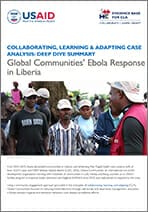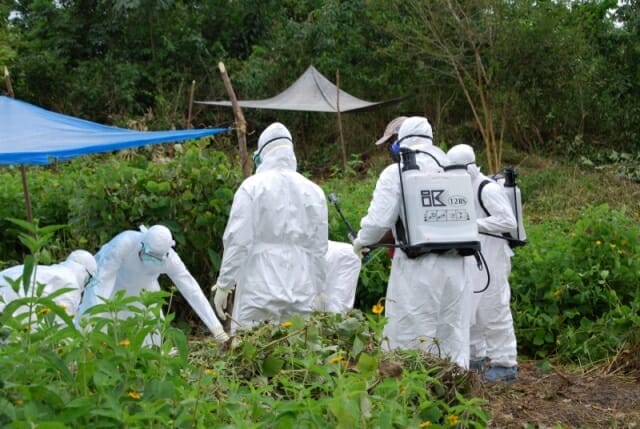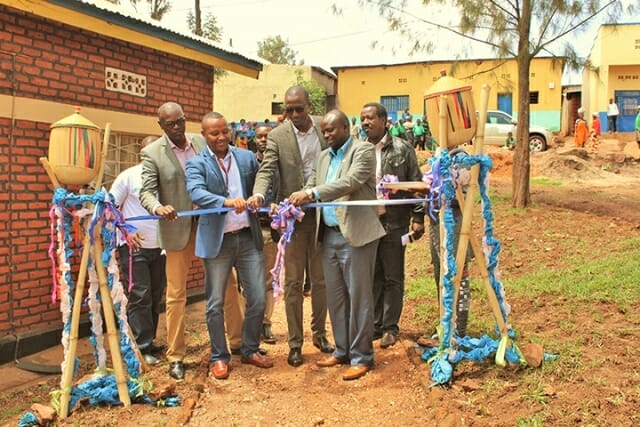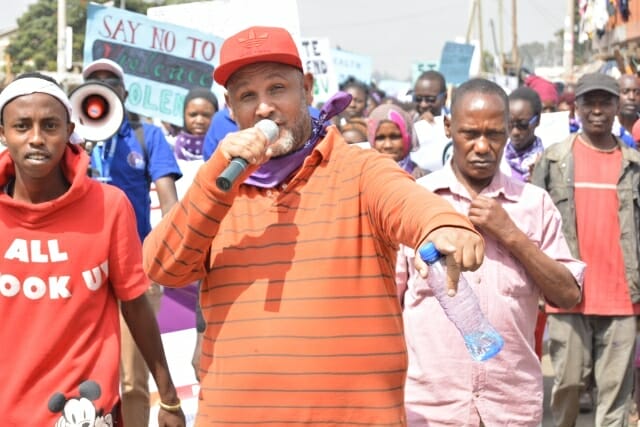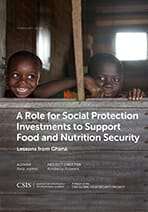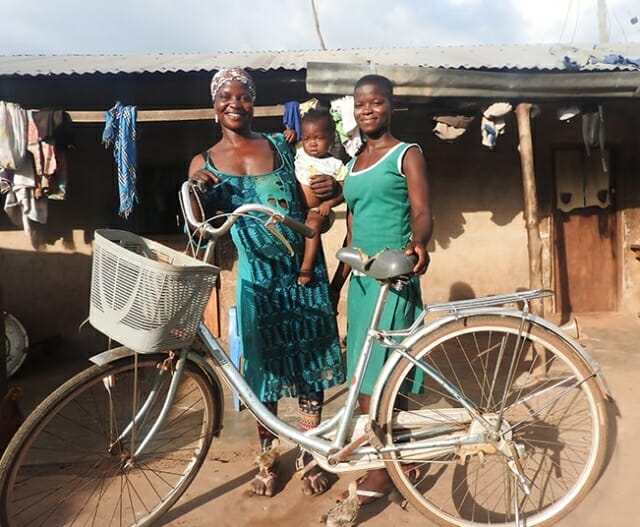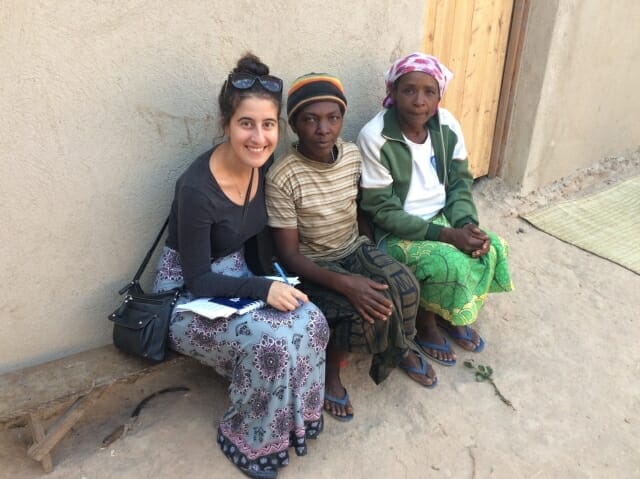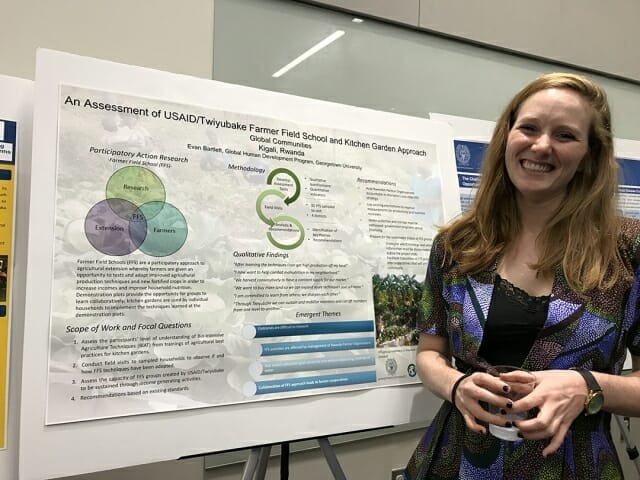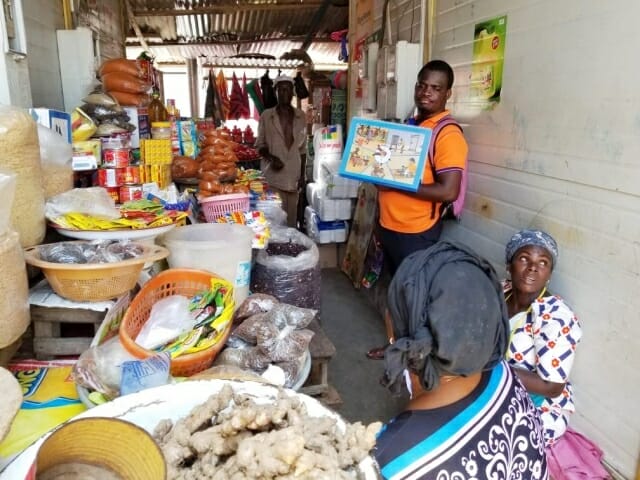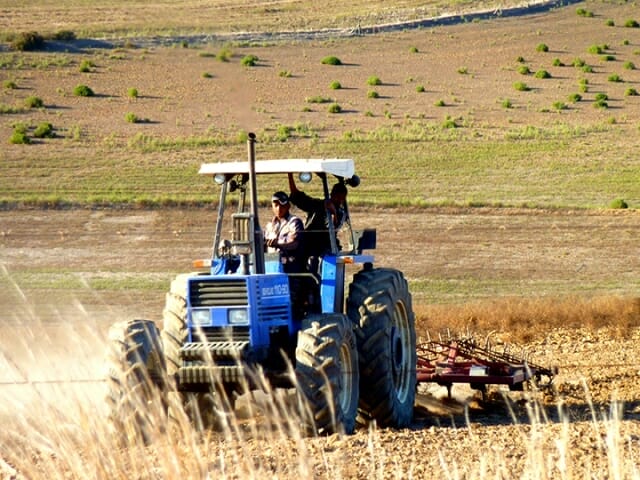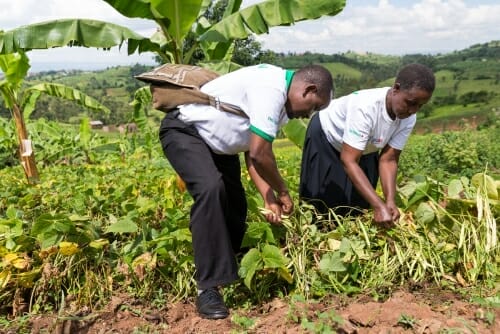Collaborating, Learning & Adapting Case Analysis: Deep Dive
Collaborating, Learning & Adapting Case Analysis: Deep Dive Global Communities’ Ebola Response in Liberia Read the full report. Read the summary. From 2014–2015, Ebola devastated communities in Liberia, overwhelming their fragile health care systems with at least 10,675 cases and 4,809 disease-related deaths (CDC, 2016). Global Communities, working with hundreds of communities in Lofa, Nimba and…
Read MoreHow Collaborating, Learning, and Adapting Led to More Effective Prevention During Liberia’s Ebola Outbreak
How Collaborating, Learning, and Adapting Led to More Effective Prevention During Liberia’s Ebola Outbreak By Ilana Shapiro and Kristin Lindell | This article originally appeared on USAID Learning Lab “Why do you only come when someone has died? Why do you not come to help when someone is sick?” This question posed by rural Liberians…
Read MorePrivate Manufacturing Companies Donate Materials for Construction of Model Public Toilet in Rwanda
Cutting the ribbon to inaugurate the public toilet (from left to right) representative of Ruliba Clays Ltd., Petrocom Ltd., Global Communities USAID Twiyubake Director of Program Management, Kayonza District Vice Mayor in charge of Social Affairs, Kabare Sector Civil Registrar. Private Manufacturing Companies Donate Materials for Construction of Model Public Toilet in Rwanda The outreach…
Read MoreCommunity-Driven Development Methods for South Sudan: Key Findings and Recommendations
Community-Driven Development Methods for South Sudan: Key Findings and Recommendations The USAID Promoting Resilience through Ongoing Participatory Engagement and Learning (PROPEL) program was designed to foster social cohesion and resilience in targeted communities in Jonglei, Lakes, and Eastern and Central Equatoria states in South Sudan through a Community-Driven Development (CDD) approach. The CDD approach is…
Read MoreBreaking the Glass Ceiling in Ghana
Breaking the Glass Ceiling in Ghana How one program is changing incentives to help women enter non-traditional occupations By Karla Yoder, Economic Development and Workforce Technical Specialist for Global Communities | This article first appeared in Medium. Ruth Medufia at her training site. Ruth Medufia is a trailblazer. The 24-year-old from Sekondi-Takoradi had always hoped…
Read MoreApplying Community-Driven Development to Strengthen Resilience in a Conflict Setting: Lessons from South Sudan
PROPEL-South Sudan End-Line Report The USAID Promoting Resilience through Ongoing Participatory Engagement and Learning (PROPEL) program was designed to foster social cohesion and resilience in targeted communities in Jonglei, Lakes, and Eastern and Central Equatoria states in South Sudan through a Community-Driven Development (CDD) approach. PROPEL provided material improvements in the lives of community members…
Read MoreWhy We Need to Talk about Men on International Women’s Day
Why We Need to Talk about Men on International Women’s Day By Betty Adera, Chief of Party for Global Communities’ DREAMS Initiative in Kenya | This article originally appeared on Medium. #MeToo has brought the subject of sexual harassment and abuse of women and girls to the public consciousness in a way never seen before. Having…
Read MoreGlobal Communities’ Programs in South Sudan
Community-driven Development for More Resilient Communities Funded by USAID, the Promoting Resiliency through Ongoing Participatory Engagement and Learning (PROPEL) program employed a locally-driven, learning-focused approach to work with communities in South Sudan and help them identify, prioritize and implement projects to improve local resiliency. Through the program, Global Communities is used its Participatory Action for Community…
Read MoreInvesting in Energy Access
Investing in Energy Access De-risking Energy Projects through Community Engagement and Financial Inclusion By Robyn McGuckin, Energy Specialist at Global Communities | This article originally appeared on Medium. Photo: Mathieu Young/Off Grid Electric Providing first-time electricity to more than 1 billion people around the world is not a task for the fainthearted. In fact, it is…
Read MoreA Role for Social Protection Investments to Support Food and Nutrition Security: Lessons from Ghana
A Role for Social Protection Investments to Support Food and Nutrition Security: Lessons from Ghana By Reid Hamel, Center for Strategic and International Studies (CSIS) Executive Summary Social safety net programs have expanded rapidly in recent decades as an instrument to combat extreme poverty and food and nutrition insecurity. In 2008, Ghana launched its Livelihoods…
Read MoreNlangmal and the Bicycle: Small Investments Making a Big Difference
Nlangmal and the Bicycle: Small Investments Making a Big Difference By Bethany Davidson,Programs Manager for Resiliency in Northern Ghana (RING) Project Nlangmal and her daughter Joyce pose proudly in front of the bicycle that she was able to buy with her first loan. Photo credit: Mohammed Ali Ibrahim, RING Project. Not long ago, Nlangmal didn’t…
Read MoreVIP: Dalia Mehiar, Developing Measures for the Categorization of Household Vulnerability
VIP Dalia Mehiar, Developing Measures for the Categorization of Household Vulnerability Rwanda, Kigali, 28 May – 28 August 2017 In the summer of 2017, Global Communities Rwanda had been preparing for year three of USAID’s five-year Twiyubake Program, also known as the Improved Services for Vulnerable Populations (ISVP) Program. The goal of the program is…
Read MoreVIP: Evan Bartlett, Using Participatory Approaches in Agriculture: Farmer Field Schools and Kitchen Gardens
VIP Evan Bartlett: Using Participatory Approaches in Agriculture: Farmer Field Schools and Kitchen Gardens Rwanda, 29 May-28 July 2017 Farmer Field Schools (FFSs) are a participatory approach to agricultural extension whereby farmers are given an opportunity to test and adopt improved agricultural production techniques and new fortified crops in order to increase incomes and improve…
Read MoreA Community Approach to Preventing Cholera in Ghana
A Community Approach to Preventing Cholera in Ghana Volunteers comb the marketplaces of Cape Coast, Ghana educating stall owners on how to prevent the spread of cholera. These efforts led to a dramatic drop in cholera incidence from 735 cases in 2016, to just 9 cases since January 2017. Spread by water or food contaminated with…
Read MoreGlobal Communities and Cargill partner to Facilitate Agricultural Trade, Improved Market Access in Kenya
Global Communities and Cargill partner to Facilitate Agricultural Trade, Improved Market Access in Kenya January 17, 2018, Silver Spring, MD — Global Communities and Cargill have entered into a strategic partnership to promote agricultural trade for small- and medium-sized agribusinesses in Kenya. The collaboration will stimulate commercial linkages between Cargill and Kenyan small- and medium-sized…
Read MorePromoting Best Practices in Cooperative Development in Uganda
Promoting Best Practices in Cooperative Development Despite rapid growth over the past decade and a decrease in poverty, approximately 27 percent of the Ugandan population continues to live below the poverty line. Much of the poverty is concentrated in rural areas of Uganda. With agriculture constituting 80 percent of the workforce, there is a need…
Read MoreVIP: Milan Bala, Accra, Ghana, Factors Impacting the Effectiveness of Program Interventions
VIP: Milan Bala, Accra, Ghana, Factors Impacting the Effectiveness of Program Interventions 24 May-28 July 2017 Access to water and sanitation are still serious challenges in Ghana, where 25% of urban households live without access to piped water and only 18% have access to adequate sanitation. The situation is similar in rural areas. Global Communities…
Read MoreCooperation Among Ugandan Farmers: Cultivating Social Capital
Cooperation Among Ugandan Farmers: Cultivating Social Capital RESEARCH ARTICLE: J.L. Morrow, Jr., Richard Patrick Joyce III, William J. McMahon, Antonio M. DeMaia, S. Caleb McVicker, Ashley E. Parsons, and Kristin Wilcox Abstract A survey was administered to 183 Ugandan farmers in August 2014 to assess the factors that influence their willingness to become members of…
Read More
